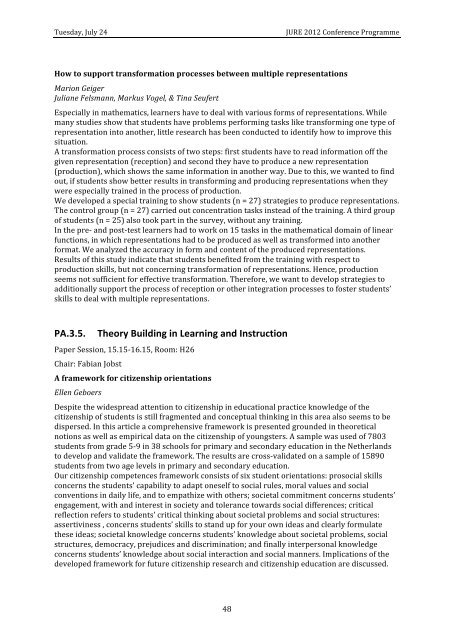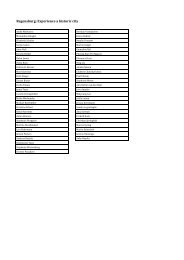JURE 2012 Programme book - EARLI Jure 2012
JURE 2012 Programme book - EARLI Jure 2012
JURE 2012 Programme book - EARLI Jure 2012
You also want an ePaper? Increase the reach of your titles
YUMPU automatically turns print PDFs into web optimized ePapers that Google loves.
Tuesday, July 24 <strong>JURE</strong> <strong>2012</strong> Conference <strong>Programme</strong><br />
How to support transformation processes between multiple representations<br />
Marion Geiger<br />
Juliane Felsmann, Markus Vogel, & Tina Seufert<br />
Especially in mathematics, learners have to deal with various forms of representations. While<br />
many studies show that students have problems performing tasks like transforming one type of<br />
representation into another, little research has been conducted to identify how to improve this<br />
situation.<br />
A transformation process consists of two steps: first students have to read information off the<br />
given representation (reception) and second they have to produce a new representation<br />
(production), which shows the same information in another way. Due to this, we wanted to find<br />
out, if students show better results in transforming and producing representations when they<br />
were especially trained in the process of production.<br />
We developed a special training to show students (n = 27) strategies to produce representations.<br />
The control group (n = 27) carried out concentration tasks instead of the training. A third group<br />
of students (n = 25) also took part in the survey, without any training.<br />
In the pre-‐ and post-‐test learners had to work on 15 tasks in the mathematical domain of linear<br />
functions, in which representations had to be produced as well as transformed into another<br />
format. We analyzed the accuracy in form and content of the produced representations.<br />
Results of this study indicate that students benefited from the training with respect to<br />
production skills, but not concerning transformation of representations. Hence, production<br />
seems not sufficient for effective transformation. Therefore, we want to develop strategies to<br />
additionally support the process of reception or other integration processes to foster students’<br />
skills to deal with multiple representations.<br />
PA.3.5. Theory Building in Learning and Instruction<br />
Paper Session, 15.15-‐16.15, Room: H26<br />
Chair: Fabian Jobst<br />
A framework for citizenship orientations<br />
Ellen Geboers<br />
Despite the widespread attention to citizenship in educational practice knowledge of the<br />
citizenship of students is still fragmented and conceptual thinking in this area also seems to be<br />
dispersed. In this article a comprehensive framework is presented grounded in theoretical<br />
notions as well as empirical data on the citizenship of youngsters. A sample was used of 7803<br />
students from grade 5-‐9 in 38 schools for primary and secondary education in the Netherlands<br />
to develop and validate the framework. The results are cross-‐validated on a sample of 15890<br />
students from two age levels in primary and secondary education.<br />
Our citizenship competences framework consists of six student orientations: prosocial skills<br />
concerns the students’ capability to adapt oneself to social rules, moral values and social<br />
conventions in daily life, and to empathize with others; societal commitment concerns students’<br />
engagement, with and interest in society and tolerance towards social differences; critical<br />
reflection refers to students’ critical thinking about societal problems and social structures:<br />
assertiviness , concerns students’ skills to stand up for your own ideas and clearly formulate<br />
these ideas; societal knowledge concerns students’ knowledge about societal problems, social<br />
structures, democracy, prejudices and discrimination; and finally interpersonal knowledge<br />
concerns students’ knowledge about social interaction and social manners. Implications of the<br />
developed framework for future citizenship research and citizenship education are discussed.<br />
48



